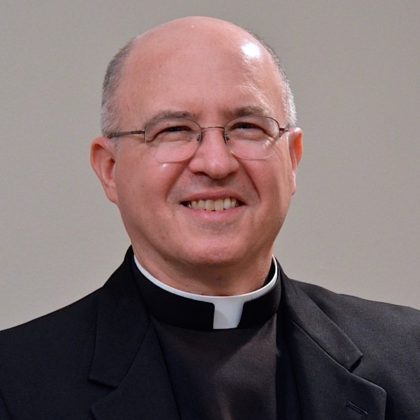 Favorite color? What makes you happy? What are you good at? What is your greatest fear… “Twenty Questions” is a regular feature in which SCJs and those with whom they minister and collaborate share a bit about themselves in an informal Q&A. Participants are given the same list of questions and are invited to answer as many as they would like.
Favorite color? What makes you happy? What are you good at? What is your greatest fear… “Twenty Questions” is a regular feature in which SCJs and those with whom they minister and collaborate share a bit about themselves in an informal Q&A. Participants are given the same list of questions and are invited to answer as many as they would like.
Fr. Stephen Huffstetter, SCJ, is vicar general of the Priests of the Sacred Heart (Dehonians). He is originally from the United States and previously served as provincial superior of the US Province.
Q: Where were you born and raised? Describe your family.
FR. STEVE: I was born and raised in the small town of Walkerton, IN, 20 miles from South Bend. I am the oldest of six children, three boys and three girls. With one set of twins we were born within 6 ½ years of each other, so we grew up as a pack, sharing so many memories and experiences. My parents were both teachers, although mom didn’t start in the classroom until my youngest brother started kindergarten. Until then, Dad barbered on Saturdays, worked in my Grandad’s convenience store at night, and picked up a variety of other jobs during the summer. All of my grandparents lived close by, and were always an important part of our life.
Q: What is your favorite book or movie?

FR. STEVE: Movie is definitely Frank Capra’s It’s a Wonderful Life, with Jimmy Stewart and Donna Reed. No one is poor who has friends! It is the small daily care for one another that often makes the biggest difference in people’s lives.
Runners up are Vertigo, One Flew over the Cuckoo’s Nest, Field of Dreams, Blues Brothers, The Sting and The Princess Bride.
Book – Tolkien’s The Lord of the Rings Trilogy, one of the few books I’ve completely read twice. I was hooked during Christmas vacation from college, and was in a frantic page turning mood one night at 2 a.m. When all seemed lost and the reinforcements came to a surprising rescue I yelled out a loud cheer and woke up everyone in the house, who thought there was a fire or some crisis.
Runners up: Bury My Heart at Wounded Knee, by Dee Brown, The Grapes of Wrath by John Steinbeck, and The Screwtape Letters by C. S. Lewis
Q: If you could travel anywhere in the world post-pandemic – without concern about the expense – where would you go and why?
FR. STEVE: Alabama, without a doubt. My travels have taken me to 37 countries, but Alabama is the only state that I have never been. I would like to visit its historical sites, and places of natural beauty. I would also like to see the White Sox AAA baseball team, the Birmingham Barons, in action.
Q: What are you good at?
FR. STEVE: When you are put into leadership positions, as I have been for many years, you usually see more of your inadequacies than strengths. My hope is that wherever I’ve been, people feel that I care about them and have tried to make our lives better.
Q: What is your favorite color?
FR. STEVE: Blue, clear as the sky, or deep as the waters.
Q: Do you have any hobbies or pastimes? If so, what are they and how did you get interested in them?
FR. STEVE: Too many! Guitar, books, movies, listening to live music, dancing (Latin, Swing and Country), yoga, Star Trek (I have seen every episode and even been to a few conventions), gaming (computer, board games, cards), visiting historical and cultural sites, huge sports fan (baseball, basketball and football). I used to collect baseball cards until I moved to Rome. I like hiking in the country and exploring cities on foot. My current concentration is visiting some of the many churches in Rome (335 so far).
Q: What is your favorite food?
FR. STEVE: Nothing can beat my mom’s roast beef and Yorkshire pudding, with her apple pie for dessert. I am also quite fond of pizza, and in Rome the choices are limitless.
Q: What is your least favorite chore?
FR. STEVE: Dusting! I let it go until it becomes annoyingly obvious.
Q: Who — living or deceased — do you most admire and why?
FR. STEVE: My mom and dad have always been there for me, and taught me so much. As for a hero I never met, Dorothy Day, for her radical commitment to the poor, her confronting sinful social structures, living a communal life, and her deep prayer life as well.
Q: What would surprise people to learn about you?
FR. STEVE: On my Junior High track team I was a pole vaulter (though not very good!).
Q: What skill or talent would you like to have that you do not? Why?
FR. STEVE: I would like to be more mechanical. I don’t have the patience to take things apart, put them back together, and really understand how they work.
Q: As a child, what did you want to be when you grew up?
FR. STEVE: Shortstop for the Chicago White Sox or shooting guard for the Boston Celtics (my favorite team before the Chicago Bulls were started). After reality set in, I thought more about being a lawyer, modeling myself after Perry Mason on TV. When I took the standard vocational interest test in high school it told me that I would be best suited to teach elementary school.
Q: What makes you happy?
FR. STEVE: Visiting family and friends, catching up on our lives and reminiscing.
Q: What is your greatest fear?
FR. STEVE: In a silly way, mice still make me squeamish. My family job was taking out the garbage, but when there was a mouse in the trap I had to talk my sister Delia into emptying the trap for me before I could fulfill my duties.
In a real way, I worry about war. Its destruction is so quick and widespread and the cause of so much displacement and misery for generations to come. And it often has such devastating personal consequences for our soldiers far beyond physical injury. The money and resources it uses up is beyond belief.
Q: What trait or habit do you dislike in yourself?
FR. STEVE: I am an expert at procrastinating when it comes to unpleasant things, then have to rush around like a madman to make sure things get done at the last minute.
Q: What trait or habit do you dislike in others?
FR. STEVE: Bullying, especially when people belittle others directly, or gossip about them in a nasty way. I don’t have much use for people who complain and criticize without offering to be part of the solution.
Q: List three words that describe you.
FR. STEVE: Gentle, optimistic, curious.
Q: How did you come to know of the Priests of the Sacred Heart (Dehonians) and what interested you about them?
FR. STEVE: Divine Heart Seminary in Donaldson, IN, was just 10 miles away from my hometown. They started a day student program for commuters who lived in the area and wanted a good Catholic education. We had no Catholic high school in Walkerton, and three other guys from our parish were driving back and forth every day. Dad asked me to join them and try it for a year to see if I liked it. I did get an incredibly good education. I got to know students from many different areas of the US, from the Carolinas to California, who were quite culturally and ethnically diverse. What I liked most about the SCJs was that they were very human and relatable. They were good teachers, but also coached and played sports with us, led us in prayer and on retreats, and rolled up their sleeves and worked alongside us when things needed to be done. They helped a lot of people and as I finished high school and thought about the future, I decided to give the college seminary program in Chicago a try.
Q: Do you consider yourself a Dehonian? If so, what does that mean to you?
FR. STEVE: Our charism is best expressed as love and reparation. I am grateful for the many blessings that God has given me. I want others to feel that same kind of love, but realize there are so many things that make life difficult and get in the way. Reparation acknowledges the sin and suffering in the world. Trusting in God, and working with others in community, we commit ourselves to promote God’s justice, love, and reign in human hearts and societies. Since I still need to make progress in that area, I consider myself a Dehonian in training
Q: What changes, adaptations or insights do you expect to stay with you from the pandemic? In other words, how do you expect to be changed by COVID-19?
FR. STEVE: Working on the General Council, all our best-laid plans have been totally changed. So many visits and meetings have been canceled. We cannot work as we used to for the foreseeable future. It has forced me to really try to live more of a “One day at a time” spirituality. The pandemic has also exposed how fragile life is and how many people live on the edge. We need to find ways to live differently and confront the inequalities that are growing more pronounced in our world.
